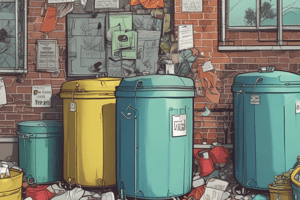Podcast
Questions and Answers
What type of waste includes contaminated sharps and laboratory waste?
What type of waste includes contaminated sharps and laboratory waste?
- Hazardous Waste
- Infectious Waste (correct)
- Radioactive Waste
- General Waste
Which practice is essential for preventing the spread of infection through waste?
Which practice is essential for preventing the spread of infection through waste?
- Minimization
- Transport
- Disposal
- Segregation (correct)
Which type of waste poses risks due to its chemical components?
Which type of waste poses risks due to its chemical components?
- General Waste
- Infectious Waste
- Radioactive Waste
- Hazardous Waste (correct)
What is the first step in the waste management hierarchy?
What is the first step in the waste management hierarchy?
What can be a consequence of poor healthcare waste management?
What can be a consequence of poor healthcare waste management?
Which stakeholder is primarily responsible for ensuring compliance with healthcare waste regulations?
Which stakeholder is primarily responsible for ensuring compliance with healthcare waste regulations?
Which waste management practice includes processes like sterilization or incineration?
Which waste management practice includes processes like sterilization or incineration?
Why is continuous training important for healthcare staff regarding waste management?
Why is continuous training important for healthcare staff regarding waste management?
Flashcards are hidden until you start studying
Study Notes
Definition
- Health care waste management involves the processes of handling, treatment, and disposal of waste generated in healthcare settings.
Types of Health Care Waste
-
Infectious Waste
- Waste that can cause infections (e.g., contaminated sharps, laboratory waste).
-
Hazardous Waste
- Waste that poses a risk to health or the environment (e.g., chemicals, pharmaceuticals).
-
General Waste
- Non-hazardous waste similar to domestic waste (e.g., packaging materials, food waste).
-
Radioactive Waste
- Waste from radioactive materials used in healthcare (e.g., used radiopharmaceuticals).
Waste Management Hierarchy
-
Prevention
- Strategies to reduce waste generation.
-
Minimization
- Reducing the amount of waste produced within healthcare facilities.
-
Reuse
- Reusing materials and equipment whenever safe and feasible.
-
Recycling
- Processing materials to create new products.
-
Treatment
- Sterilization, incineration, or other methods to reduce waste volume and risk.
-
Disposal
- Safe disposal methods, such as landfilling or deep-well injection.
Key Practices
-
Segregation
- Separating waste at the point of generation into different categories.
-
Storage
- Safe and secure storage of waste before treatment or disposal.
-
Transport
- Safe transport within healthcare facilities and to external treatment or disposal sites.
Regulations and Guidelines
- Compliance with national and international regulations (e.g., WHO guidelines).
- Development of waste management plans specific to healthcare facilities.
Risks of Poor Waste Management
-
Infectious Disease Spread
- Potential for healthcare-associated infections.
-
Environmental Impact
- Contamination of soil and water sources.
-
Health Hazards
- Exposure to toxic substances can harm healthcare workers and the public.
Importance of Training
- Continuous education and training for healthcare staff regarding waste management protocols.
Stakeholders Involved
- Government bodies, healthcare facilities, waste management companies, and the community.
Best Practices
- Regular audits of waste management practices.
- Implementing a culture of safety and responsibility among healthcare workers.
Definition
- Health care waste management includes the handling, treatment, and disposal of waste generated in healthcare environments.
Types of Health Care Waste
- Infectious Waste: Includes items like contaminated sharps and laboratory waste that can transmit infections.
- Hazardous Waste: Consists of substances such as chemicals and pharmaceuticals that pose risks to health or the environment.
- General Waste: Comprised of non-hazardous materials, similar to domestic waste, including packaging and food waste.
- Radioactive Waste: Generated from the use of radioactive materials in healthcare, specifically used radiopharmaceuticals.
Waste Management Hierarchy
- Prevention: Focused on strategies to minimize waste generation at the source.
- Minimization: Aims to decrease the quantity of waste produced in healthcare facilities.
- Reuse: Encourages the safe and feasible reuse of materials and equipment.
- Recycling: Involves processing waste materials to create new products.
- Treatment: Includes methods like sterilization and incineration to reduce waste volume and risk.
- Disposal: Ensures safe disposal techniques such as landfilling or deep-well injection are utilized.
Key Practices
- Segregation: Essential to separate waste into appropriate categories at the point of generation.
- Storage: Involves securely storing waste prior to its treatment or disposal.
- Transport: Requires safe transportation of waste within healthcare facilities and to external disposal sites.
Regulations and Guidelines
- Healthcare facilities must comply with national and international regulations, including WHO guidelines.
- Development of tailored waste management plans for specific healthcare settings is crucial.
Risks of Poor Waste Management
- Infectious Disease Spread: Inadequate waste management can lead to healthcare-associated infections.
- Environmental Impact: Poor practices may result in contamination of soil and water resources.
- Health Hazards: Exposure to toxic substances poses risks to healthcare workers and the general public.
Importance of Training
- Continuous training and education for healthcare staff is vital for adherence to waste management protocols.
Stakeholders Involved
- Key stakeholders include government bodies, healthcare facilities, waste management companies, and the community.
Best Practices
- Conduct regular audits to assess waste management practices.
- Foster a culture of safety and responsibility among healthcare personnel regarding waste disposal.
Studying That Suits You
Use AI to generate personalized quizzes and flashcards to suit your learning preferences.




